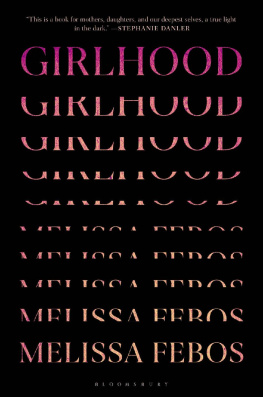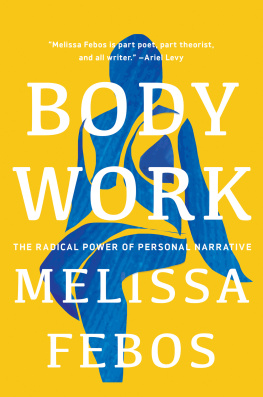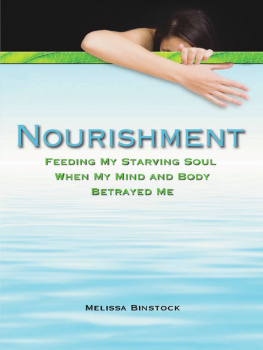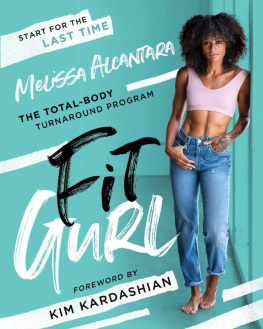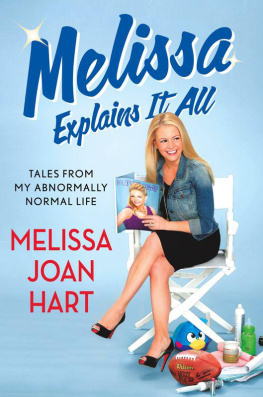
FOR MOM, TO WHOM I OWE EVERYTHING AND FROM WHOM I HEARD ALL OF IT FIRST
BY THE SAME AUTHOR
Abandon Me
Whip Smart

CONTENTS
Destruction is thus always restorationthat is, the destruction of a set of categories that introduce artificial divisions into an otherwise unified ontology.
Judith Butler, Gender Trouble
To say: no person, trying to take responsibility for her or his identity, should have to be so alone. There must be those among whom we can sit down and weep, and still be counted as warriors. (I make up this strange, angry packet for you, threaded with love.) I think you thought there was no such place for you, and perhaps there was none then, and perhaps there is none now; but we will have to make it, we who want an end to suffering, who want to change the laws of history, if we are not to give ourselves away .
Adrienne Rich, Sources
The story went like this: I was a happy child, if also a strange one. There were griefs, but I was safe and well-loved. The age of ten or eleventhe time when my childhood became more distinctly a girl hoodmarked a violent turn from this. Everyone knows that adolescents rebel, girls in particular. Still, my own girlhood felt tinged by a darkness that the story of adolescent rebellion did not suffice to explain. In the years since, I have worried the question: What was wrong with me? I did not deserve to have been so tormented.
Despite how unspeakable it felt at the time, I no longer think that the pains or darkness of my own girlhood were exceptional. It is a darker time for many than we are often willing to acknowledge. During it, we learn to adopt a story about ourselveswhat our value is, what beauty is, what is harmful and what is normaland to privilege the feelings, comfort, perceptions, and power of others over our own. This training of our minds can lead to the exile of many parts of the self, to hatred for and the abuse of our own bodies, the policing of other girls, and a lifetime of allegiance to values that do not prioritize our safety, happiness, freedom, or pleasure. Though mine was among the last girlhoods untouched by the internet, I have found many of the same challenges among those whove grown up since.
For years, I considered it impossible to undo much of this indoctrination. Knowing about it was not enough. But I have found its undoing more possible than I suspected. The same way that I have taught my mind and my body to collaborate in a habitual set of practices that eventually coalesce into a skill that can be strengthened, such as throwing a softball, singing, jogging long distances, or writingso I have found it possible to train my mind to act in accordance with my beliefs (and sometimes to discover what those are). Like any process of conditioning, it is tedious, minute, and demands rigorous attention. It cannot be done alone.
It is in part by writing this book that I have corrected the story of my own girlhood and found ways to recover myself. I have found company in the stories of other women, and the revelation of all our ordinariness has itself been curative. Writing has always been a way to reconcile my lived experience with the narratives available to describe it (or lack thereof). My hope is that these essays do some of that work for you, too.
Melissa Febos
March 2020
New York, New York

- First, the knees. They meet the gravel, the street, the blunt hips of curbs. Pain is the bright light flashing, forgotten for Vegas colors, then Halleys Cometa burning streak behind the clouds. Your father holds you up to the sky, tells you, Look . Tells you, Remember this . You, small animal in the pink dress from your abuela, dirty sneakers, bloody knees, looking up.
- The oven is eye level and your forearms striped with burns. A tally of each time you reach over your depth. Are you just a child, or already Einsteins definition of insanity? You like to be marked. Your mother, though, wails when she drops a blueberry pie from that height, sinks into the gory glory of its mess just before your father leaves port again. Oh, to stripe the floor with your own scalding compote. You stay closed, you hot box, you little teapot. You fill, but never empty. You stay striped.
- They call it a faggot test. Do you know what a faggot is, or only that you are part boy? Rub the pencils pink end across the back of your hand until it erases you. The circle of boys claps when you draw blood. After school, your mothers stricken face scares you, but later, you are glad she saw the peeled pink of itsaw that it was in you.
- Your best friend flowers your limbs with bruisesIndian sunburn, snake bite, monkey bite, her pale knuckles vised into your thigh. Her fingernails carve you, one time permanently. Only your body flinches. You know the need to engrave things. After baseball practice, still in cleats, when she presses her mouth against your neck under the mildewed blanket in your basement, you are sorry her hot mouth leaves no mark.
- Your mother watches you watch a boy on your baseball team. She never meets your first love, a Cape Verdean boy to whom you barely speak. Verdean, verdant , you whisper, craving sounds that fill your mouth. What are you? he asks, as so many have. You whisper cerulean, figlia, Melitta, querida . You are nothing, just a shard beating the shore. Just a small animal you fling into the sea. Behind the mall, break dancers spin on sheets of cardboard, and from that circle of boys, he throws a rock that finds your face. Blood on your mouth, you call your father from a pay phone. Baseball at dusk? You know better , he says, though he is proud. He has coached your teams since Little League. He wraps ice packs in dish towels, makes you hold them against the new scar. Your eyes blacken anyway.
- In the locker room, you perfect the art of changing your clothes under your clothes. Your body is a secret you keep, a white rabbit, and you the magician who disappears it. Remember: this is a hard hustle to break. It is difficult to keep some secrets and not others. Hustle now, across that field, forgetting your body as only this allows, and reach for the ball that scorches your hand with pain. See what happens when you forget yourself? It is better to choose your pain than to let it choose you.
- In the tiny bathroom of your fathers house, you tuck your fingers into your mouth until sweat beads your body and your throat bitters. All day, you rub your tongue against the scraped inside, the bitten knuckle. You are sore for days, but it doesnt keep. You choose it, and then it chooses you.
- At sixteen, you shave your head, disappointed that no curb or wall or rock has altered its perfect sphere. Your fathers stricken face pleases you. When you pierce your nose, he tells you no one will ever see your face again for the glare. You dont tell him thats the point. When he looks at you, he sees only the message you carry, written in a language he never taught you, not Spanish, but the other language of his childhood, the one that leaves marks. You quit baseball and move out of his house.
- Instead of ten holes, your body now has twenty-three. You stop returning your fathers phone calls. You dont listen to his messages. At night, you touch each opening, drawing the constellation of your body: Lyra, Libra, Big Dipper, flickering Vega, binary Mizar, you bucket of light, you horse and rider. You lick your fingers and tuck them inside, tug on these mouths and others, the knots of skin between you, and you, and you.

